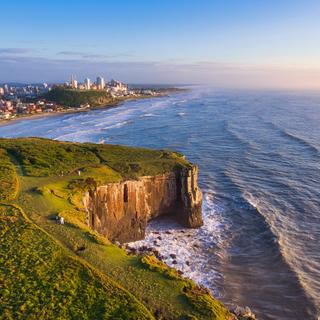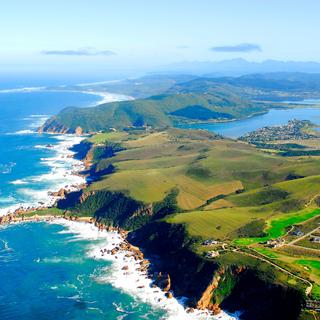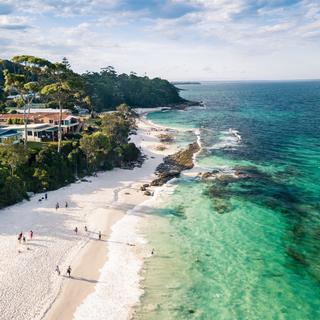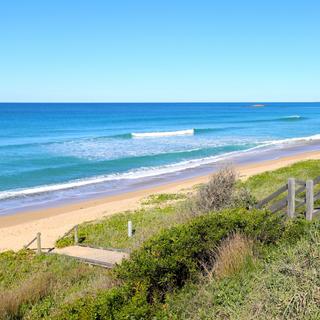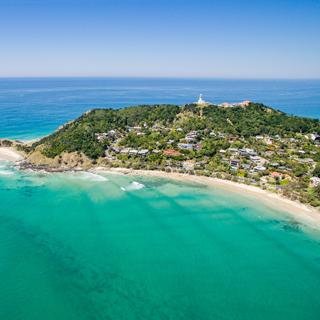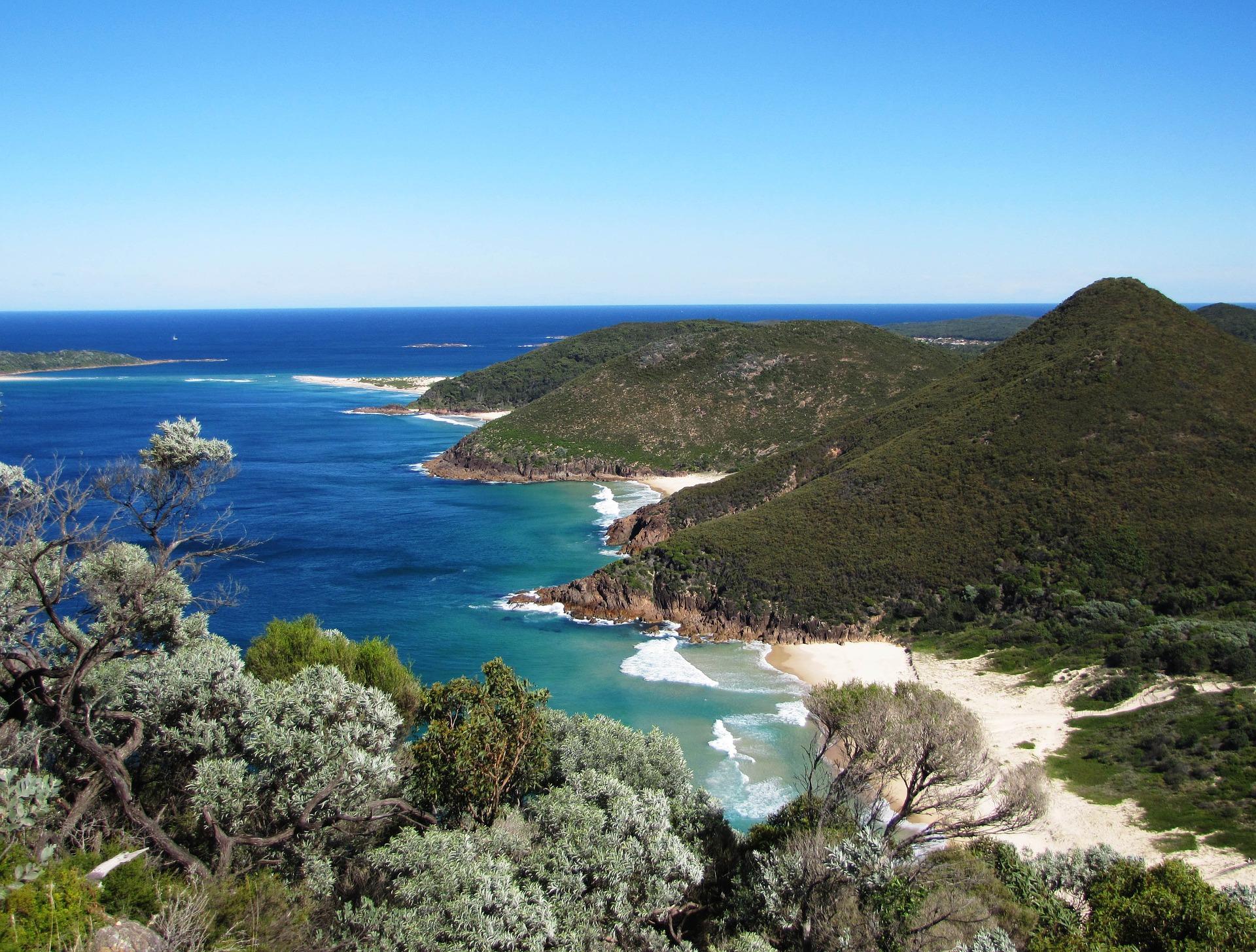
Nelson Bay weather and climate in 2025

Nelson Bay weather and climate in 2025
Day
19 °C
Night
8 °C
Sea
18 °C
Precipitation
83 mm
in month
Rainy days
8 days
in month
Daylight
11 hours
average
Sunshine
7 hours
average
Humidity
61 %
Weather charts for Nelson Bay
Destinations nearby and activities
Destinations nearby
Activities in Nelson Bay

Find more destinations like this
Destinations with similar weather to Nelson Bay
Other destinations in New South Wales - Australia
Closest cities for Nelson Bay
Weather overview for Nelson Bay
Weather overview
Nestled in the southeastern coastline of Australia, Nelson Bay boasts a predominantly warm climate. Daytime temperatures can soar to a toasty 27 °C (80 °F) in February, while dipping to a cooler 18 °C (64 °F) in the heart of July. Nelson Bay's balmy nights peak in February, where the mercury can hit 19 °C (66 °F), and in stark contrast, July nights can drop to a crisp 8 °C (47 °F). Witness the inviting sea temperatures crest at 24 °C (74 °F) during February's summery embrace and plunge to a refreshingly cooler 18 °C (65 °F) in the grip of August. When it comes to precipitation, Nelson Bay's skies are least generous in September, gracing the area with merely 8 days of rainfall, whereas March tests rain gears with its hearty 12 days drench.
January weather
January in Nelson Bay demonstrates a noticeable increase in both day and sea temperatures, reaching 27 °C (80 °F) and 23 °C (73 °F) respectively. A spike in the tourist influx can be seen, complemented by an uptick in precipitation numbers to 84 mm (3.30 in) and the outset of more frequent rainy days. Nighttime warmth persists, showing an increase to 19 °C (65 °F).
February weather
February marks the zenith of daytime warmth in Nelson Bay with a 27 °C (80 °F) reading, while the sea temperature echoes this peak at 24 °C (74 °F). The continuity of increasing rainy days mirrors the previous month, and one can notice a slight reduction in sun hours to 7 hours, hinting that the tourist season is nearing its apex. February also records the ultimate night temperatures, while providing the longest daylight hours at 14 hours.
March weather
In March, Nelson Bay undergoes a subtle downturn in both day and sea temperatures, registering 26 °C (78 °F) and 23 °C (74 °F) respectively. Amid the tourist season, the maximum rainy days rear their head at 12 days.
April weather
April's tale of the temperature continues with a steady decline to 24 °C (74 °F) during the day. The marine warmth eases off to 22 °C (72 °F), amidst an active tourist scene. Rainy days begin to lessen in number, now at 12 days, while the peak of rainfall volume is hit this month. The wind's breath is gentlest at this time, its whispers slowing to 3.
May weather
May experiences a continuation of the descending trend in day temperatures, which currently stand at 21 °C (70 °F) in Nelson Bay, along with a prolonged sea temperature decline now at 21 °C (70 °F). With the tourist season still in play, a marked reduction in rainfall kicks in. The onset of fewer sunlit hours is now at 6 hours, with the night temperature dropping to 12 °C (53 °F).
June weather
June's chill is more pronounced as the sea temperature falls to 20 °C (68 °F) and the day temperature reflects a similar descent to 19 °C (65 °F). The night air cools further to 9 °C (49 °F). The commencement of a rise in precipitation volume is noted, tallying at 138 mm (5.43 in). The least number of sun hours is now present, averaging at 6 hours. Length of daylight experiences its shortest span.
July weather
July asserts the coldest days of the year for Nelson Bay with a svelte 18 °C (64 °F), and sea temperatures concur with a minimum of 19 °C (66 °F). An emergence of fewer rainy days is seen, down to 10 days, and rainfall volume likewise starts a retreat. Nighttime temperatures hit their lowest at 8 °C (47 °F). The upward trend in sunny hours begins to take shape, now approximating 7 hours.
August weather
August heralds a slight increase in day temperatures to 19 °C (67 °F), while sea temperatures touch their nadir at 18 °C (65 °F). Raininess continues to decline, now down to 8 days, and the decrease in rainfall is also noteworthy. An uptick in sunshine duration becomes apparent, registering 7 hours.
September weather
As the tourist season commences in September, the day temperature nudges upward to 22 °C (71 °F), while a rise in night temperatures is also evident, now at 11 °C (51 °F). The least number of rainy days is observed, coming in at 8 days, and a notable minimum in rainfall is also marked. The humidity drops to its lowest, now sitting at 58 %.
October weather
October's warmth blooms further with day temperatures rising to 23 °C (74 °F) and the sea beginning its warm-up at 19 °C (67 °F). The starting incline in rainy days is observed, estimated at 9 days, alongside a similar trend in rainfall volume. Night temperatures keep up their ascent, documented at 13 °C (56 °F).
November weather
November sees the day temperature continue its climb to 24 °C (76 °F) in Nelson Bay, concurrent with a rise in sea temperatures to 20 °C (68 °F). The tourist season is in full swing. Rainfall volume keeps on burgeoning, now at 104 mm (4.09 in). Nighttime temperatures are also on an upswing, now at 15 °C (59 °F). The pinnacle of sunny hours is reached this month, offering a maximum of 8 hours.
December weather
December in Nelson Bay is characterized by a burgeoning tourist season. Day temperatures ascend in kind, reaching 26 °C (79 °F), alongside a sustained rise in sea temperatures which now stand at 22 °C (71 °F). The early signs of a reduction in rainy days are glimpsed. Day length is at its maximum, quantified at 14 hours. The warmth of the night continues to climb, now at 17 °C (63 °F).
FAQs
How warm is the day temperature in January?
With the mercury climbing to 27 °C (80 °F), January days in Nelson Bay are quite toasty and inviting for beachgoers.
What is the duration of daylight in February?
February enjoys extensive daylight hours, averaging a generous 14 hours of natural light.
What are the sea temperatures like in March in Nelson Bay?
March sees the sea temperatures in Nelson Bay dipping slightly to 23 °C (74 °F), still temperate for various water activities.
During April, how does the sea temperature change in Nelson Bay?
As April unfolds, Nelson Bay witnesses a slight cooling of the sea with temperatures at 22 °C (72 °F), yet remains inviting to those seeking a swim.
What is the sea temperature in May in Nelson Bay?
May brings cooler sea waters in Nelson Bay, registering a temperature of 21 °C (70 °F).
How does the night temperature trend in June in Nelson Bay?
June nights in Nelson Bay become noticeably cooler with temperatures dipping to around 9 °C (49 °F).
What is the general weather trend in Nelson Bay during July?
Nelson Bay's July weather is characterized by its coldest days, lowest sea and night temperatures, and a downtrend in rainfall.
How are the rainy days distributed in August in Nelson Bay?
August in Nelson Bay typically is characterized by fewer rainy days, numbering around 8 days.
What characterizes the start of the tourist season in Nelson Bay in September?
September marks the onset of the tourist season in Nelson Bay with increasing day and night temperatures and the least rainfall.
How does October's weather prepare Nelson Bay for tourist visits?
October’s climate in Nelson Bay becomes increasingly agreeable for visitors, with higher day and night temperatures, and a still manageable number of rainy days.
How do increasing temperatures in November affect the appeal of Nelson Bay?
November's increasing day and sea temperatures combined with plenty of sun make Nelson Bay an attractive destination for end-of-year vacations.
What are the expectations for Nelson Bay's climate in December?
Expect December in Nelson Bay to feature rising day and sea temperatures, ample daylight hours, and tempering of rainy days.

